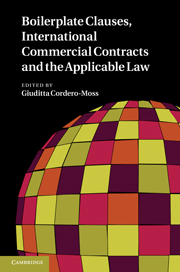Book contents
- Frontmatter
- Contents
- List of contributors
- Preface
- Introduction
- PART 1 How contracts are written in practice
- PART 2 Methodological challenges
- PART 3 The applicable law's effects on boilerplate clauses
- Introduction to Part 3
- 7 The common law tradition: application of boilerplate clauses under English law
- 8 The Germanic tradition: application of boilerplate clauses under German law
- 9 The Romanistic tradition: application of boilerplate clauses under French law
- 10 The Romanistic tradition: application of boilerplate clauses under Italian law
- 11 The Nordic tradition: application of boilerplate clauses under Danish law
- 12 The Nordic tradition: application of boilerplate clauses under Finnish Law
- 13 The Nordic tradition: application of boilerplate clauses under Norwegian law
- 14 The Nordic tradition: application of boilerplate clauses under Swedish law
- 15 The East European tradition: application of boilerplate clauses under Hungarian law
- 16 The East European tradition: application of boilerplate clauses under Russian law
- Conclusion: the self-sufficient contract, uniformly interpreted on the basis of its own terms: an illusion, but not fully useless
- Bibliography
- Index
Introduction to Part 3
from PART 3 - The applicable law's effects on boilerplate clauses
Published online by Cambridge University Press: 11 April 2011
- Frontmatter
- Contents
- List of contributors
- Preface
- Introduction
- PART 1 How contracts are written in practice
- PART 2 Methodological challenges
- PART 3 The applicable law's effects on boilerplate clauses
- Introduction to Part 3
- 7 The common law tradition: application of boilerplate clauses under English law
- 8 The Germanic tradition: application of boilerplate clauses under German law
- 9 The Romanistic tradition: application of boilerplate clauses under French law
- 10 The Romanistic tradition: application of boilerplate clauses under Italian law
- 11 The Nordic tradition: application of boilerplate clauses under Danish law
- 12 The Nordic tradition: application of boilerplate clauses under Finnish Law
- 13 The Nordic tradition: application of boilerplate clauses under Norwegian law
- 14 The Nordic tradition: application of boilerplate clauses under Swedish law
- 15 The East European tradition: application of boilerplate clauses under Hungarian law
- 16 The East European tradition: application of boilerplate clauses under Russian law
- Conclusion: the self-sufficient contract, uniformly interpreted on the basis of its own terms: an illusion, but not fully useless
- Bibliography
- Index
Summary
Today, international commercial contracts are, with only a few exceptions, drafted on the basis of common law models. As Part 1 of this book showed, these models are only to a limited extent adapted to meet the requirements of the contract law that will govern them. As seen in Part 2, the simple adoption of a contract model inspired by common law may not be deemed to be a tacit choice of common law to govern the contract (particularly because common law is not a defined system). Part 2 also showed the difficulty of harmonising general contract law on an international level. Thus, contracts often present clauses and terminology that are not tailored to, or even not compatible with, the applicable law.
This drafting practice creates a need for coordinating the legal concepts upon which the contract is based, with the legal concepts that the governing law imposes on the contract.
There are various examples of clauses that are obviously inspired by a common law system and do not have a corresponding provision in the chosen law, if the law chosen by the parties to govern the contract belongs to a civilian system. For example, in a contract subject to a civilian law and with an exclusive jurisdiction clause in favour of the courts in a civilian country, a clause regulating the use of equitable remedies such as estoppels would not make sense. These are a phenomenon of common law and do not exist in civilian laws.
- Type
- Chapter
- Information
- Publisher: Cambridge University PressPrint publication year: 2011



